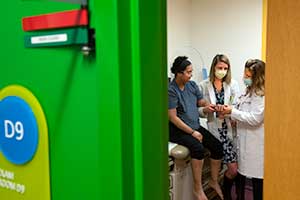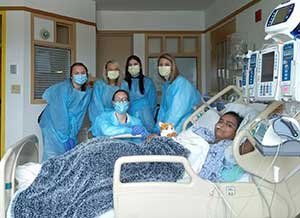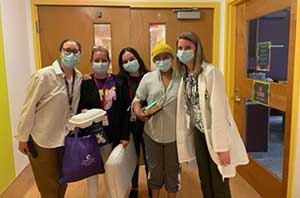For 22-year-old Palm Beach native Aryzabella (Ary) Camacho, a stem cell transplant at UPMC Children’s Hospital of Pittsburgh meant new hope for a future full of possibility and not limited by her medical conditions.
At the age of 13, Ary experienced muscle weakness, fatigue, and rapid weight loss. In fact, she lost about 20 pounds in 20 days. A clinical examination showed joint tenderness and significant muscle weakness. She could not rise from a seated position or cross her legs to sit in a butterfly position. Her pediatrician also noted a rash on her knuckles and fingers.
These symptoms led the doctor to diagnose her with juvenile dermatomyositis (JDM). JDM is an inflammatory autoimmune disease of the muscle, skin, and blood vessels that affects about three in 1 million children. Most patients with JDM experience muscle weakness and skin rash, cause unknown. JDM affects girls about twice as often as boys.
Despite more than six years of persistent immunosuppressive drug therapy, her condition slowly progressed, leaving her muscles weaker and weaker.
This was around the time Ary received another diagnosis. A rheumatologist in Miami diagnosed her with juvenile systemic scleroderma (JSSc), a rare autoimmune disorder in children that causes thickness and tightening of the skin, decreased joint motion, and discoloration with coolness of the fingers and hands (Raynaud's phenomenon). JSSc is a disease that commonly overlaps with dermatomyositis.
That doctor referred Ary and her family elsewhere for more specialized treatment of her conditions. He presented her with two main referral recommendations. One option was the Juvenile Systemic Scleroderma Center at UPMC Children’s Hospital.
From the Sunshine State to the Steel City
 It was Ary and her family's interest in a specific, innovative lab at UPMC Children’s Hospital that helped them make their decision to seek care there.
It was Ary and her family's interest in a specific, innovative lab at UPMC Children’s Hospital that helped them make their decision to seek care there.
That lab is the Torok Lab, led by Kathryn Torok, MD, pediatric rheumatologist and director of the Juvenile Systemic Scleroderma Center. It is the only lab in the country with a dedicated autologous (self) stem cell transplant program for JSSc. Dr. Torok and her team treat patients with JSSc including:
- Those with overlapping disease (such as dermatomyositis).
- Those with aggressive disease.
- Those who, like Ary, have not had success with numerous immunosuppressants.
The Juvenile Systemic Scleroderma Center at Children’s is unique in its multidisciplinary approach to caring for patients with JSSc.
Specialists from Rheumatology, Gastroenterology, Cardiology, Pulmonology, Bone Marrow Transplant and Cellular Therapies, Physical Therapy, and other areas comprise the team. All the specialists are familiar with the nuances of the disease to ensure the safety and efficacy of the treatment program.
“Sometimes [the stem cell transplant] is their ‘last chance,’” says Dr. Torok. “It ‘resets’ patients’ immune systems by reprogramming the system to ‘forget’ the signals to attack the body. By keeping only the immature ‘baby cells’ around, they don’t learn the bad habits from the more mature ‘older’ cells.”
Since her original diagnosis, Ary has been largely confined to her house due to the limitations her illnesses placed on her.
“Before my transplant I was unable to take the cap off of a pen, open a water bottle, brush my hair, nor walk down the street,” she says.
In addition to the impact her muscle weakness had on Ary’s daily activities, Dr. Torok adds, “her breathing tests were showing that her pulmonary muscles were getting weaker and weaker. It was to the point where she may have needed to rely on breathing devices if things kept going in the wrong direction.”
An autologous stem cell transplant would be part of a trial, and positive outcomes were not 100% guaranteed. However, a stem cell transplant was one of the only options available to help Ary claim a better quality of life. Ary, her doctors, and her family decided a transplant would be the best course of action for her.
“I was on board with everything. I knew it would require me to be gone for many months, but I was lucky to have my mom and grandma with me the whole time. All I could think about was how much better my life was going to be and how this would benefit me. My mom and grandma agreed. I knew we had to give it a try.”
The Road to a Life-Changing Transplant
Leading up to her transplant, Ary met with several specialists at Children’s. These were the specialists whose care she would be under for her treatment. In addition to Dr. Torok, the team included:
- Paul Szabolcs, MD, chief of Bone Marrow Transplantation and Cellular Therapies.
- Franziska Rosser, MD, MPH, FAAP, clinician and research scientist in Pediatric Pulmonology.
- Kirsten Rose-Felker, MD, pulmonary arterial hypertension specialist in Pediatric Cardiology.
- Vibha Sood, MD, pediatric gastroenterologist motility expert and director of the Motility Center.
- Lauren Farver, PT, expert physical therapist in pulmonary muscle and breathing rehabilitation.
“Of course I was a little anxious, but I was mostly excited and preparing myself for what was to come,” says Ary of her stem cell transplant. “But not once during the process did I feel confused or scared. Everyone involved made sure I was comfortable and knew what was going on. [The staff at UPMC Children’s] explain things clearly. I felt really comfortable. I felt like I was safe.”
Due to the rarity of her disease and the innovative nature of the treatment, Ary was only the fourth person to have a stem cell transplant for JSSc. Fortunately, on one of Ary's trips to Pittsburgh pre-transplant, one of the other transplantees was also in Pittsburgh. Ary was able to meet with the girl and her family. Ary noted that it was very helpful to hear from someone who had been in her shoes and could explain what to expect in regards to some aspects of the care process.
 In May 2021, Ary underwent her transplant. She was first admitted a few weeks before the transplant for mobilization. Another brief admission followed to harvest and freeze the ‘baby’ stem cells for a few weeks.
In May 2021, Ary underwent her transplant. She was first admitted a few weeks before the transplant for mobilization. Another brief admission followed to harvest and freeze the ‘baby’ stem cells for a few weeks.
Then came Ary’s admission for the actual transplant, which takes about four to six weeks. During that time, Ary had intensive chemotherapy and total body radiation with lung protection for about a week. Then followed an infusion of her own frozen (‘baby’) stem cells. Then they waited for the stem cells to grow.
Ary had engraftment (the bone marrow ‘waking up’ and beginning to make cells) of the main infection fighting cells (neutrophils) on day 11. Then her platelets (blood-clotting cells) were engrafted on day 19. Aside from a drug reaction, which was treated without complication, Ary was fortunate not to have any major issues with the transplant, such as infection or any major organ issues.
Only 22 days after her transplant, Ary was discharged to the Ronald McDonald House where she stayed with her family for several months. During that time, she made frequent visits to Bone Marrow Transplant in the adjoining hospital for monitoring.
Shortly after her transplant, Ary noticed “subtle yet positive differences.”
“I was able to get up from a chair without having to hold onto the arm rests. I was able to get up quicker and move around easier, which for me and my family was a huge deal,” says Ary. “Due to my conditions, my muscle mass just wasn’t there. But about a month in, my strength got better and some of my muscle had returned. And as time went on my skin began to change too. [The skin] was loosening up and wasn’t as tight or itchy anymore. I also went from what seemed to be thirty pills a day to basically five [pills], which has had a big impact on my day-to-day agenda.”
“I was amazed at the progress Ary made in a short time,” says Dr. Torok. “Within a month she could move around the examination room without much effort.”
Perhaps most of all, Ary gained more independence post-transplant. She is more comfortable and empowered to do more day-to-day activities by herself. After 182 days at Ronald McDonald House, the team cleared Ary to return to her home in Florida.
A New, Positive Outlook for Ary
 As of today, Ary is approaching her one-year anniversary of her transplant and is doing great.
As of today, Ary is approaching her one-year anniversary of her transplant and is doing great.
At her six-month follow-up appointment, Dr. Torok remarked that Ary “was walking all around the hospital without being totally fatigued."
“When I first met Ary, she needed a wheelchair to go from appointment to appointment, even if it was just down the hall. It would be exhausting for her," says Dr. Torok. "I was so happy I cried when I saw what she could do now.”
She is a frequent visitor of Pittsburgh, coming back every three or so months to check in with her care team and undergo tests to track how everything is doing. Now an honorary “yinzer”, Ary insists she prefers the Pittsburgh weather to her home Sunshine State.
“I love Pittsburgh! I love the cold. I love the people. Everyone is so nice and mellow,” says Ary.
And a big part of her love for Pittsburgh comes down to her team at Children’s, especially Dr. Torok.
“[Dr. Torok] went above and beyond in making sure I was comfortable,” said Ary. “She gave me a really nice big pillow and things to entertain me while in isolation. She’s very kind and always uplifting. She’s amazing. I just love her so much.”
Ary was just recently vaccinated for COVID-19. She is hopeful that at the one-year mark, she will be approved for other vaccinations that will allow her to do more and more. For fun, Ary loves to hang out with her friends and play video games. In the future, she hopes to visit Colombia, where her grandma lives.
Ary says she is thankful to have gone through this process and for those who were there to support her through it all.
“My family; my transplant team, Dr. Torok and Dr. Szabolcs and their staff; Dr. Rivas Chacon and his team in Miami; the staff at the Ronald McDonald House; and all of the UPMC staff – thank you so much. I am very grateful to have had this opportunity. I am now living proof that this transplant can change lives for the better. I now have a positive outlook on my future.”









